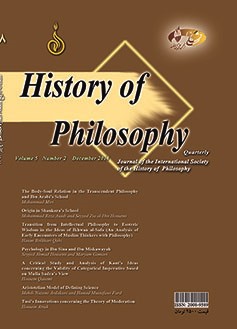-
-
List of Articles
-
Open Access Article
1 - سخن سردبیر
Hossein Kalbasi Ashtari -
Open Access Article
2 - The Body-Soul Relation in the Transcendent Philosophy and Ibn Arabi’s School
Mohammad Miri -
Open Access Article
3 - Origin in Shankara’s School
Seyyed Zia al-Din Hosseini Mohammad Reza Asadi -
Open Access Article
4 - Transition from Intellectual Philosophy to Esoteric Wisdom in the Ideas of Ikhwan al-Safa (An Analysis of Early Encounters of Muslim Thinkers with Philosophy)
Hasan Bolkhari Qehi -
Open Access Article
5 - Psychology in Ibn Sina and Ibn Miskawayah
Seyyed Ahmad Hosseinee Maryam Gomari -
Open Access Article
6 - A Critical Study and Analysis of Kant’s Ideas concerning the Validity of Categorical Imperative based on Mulla Sadra’s View
Hossein Qasemi -
Open Access Article
7 - Aristotelian Model of Defining Science
Mehdi Nazemi Ardakani Hamed Mustafawi Fard -
Open Access Article
8 - Tusi’s Innovations concerning the Theory of Moderation
Hossein Atrak
-
The rights to this website are owned by the Raimag Press Management System.
Copyright © 2017-2026







